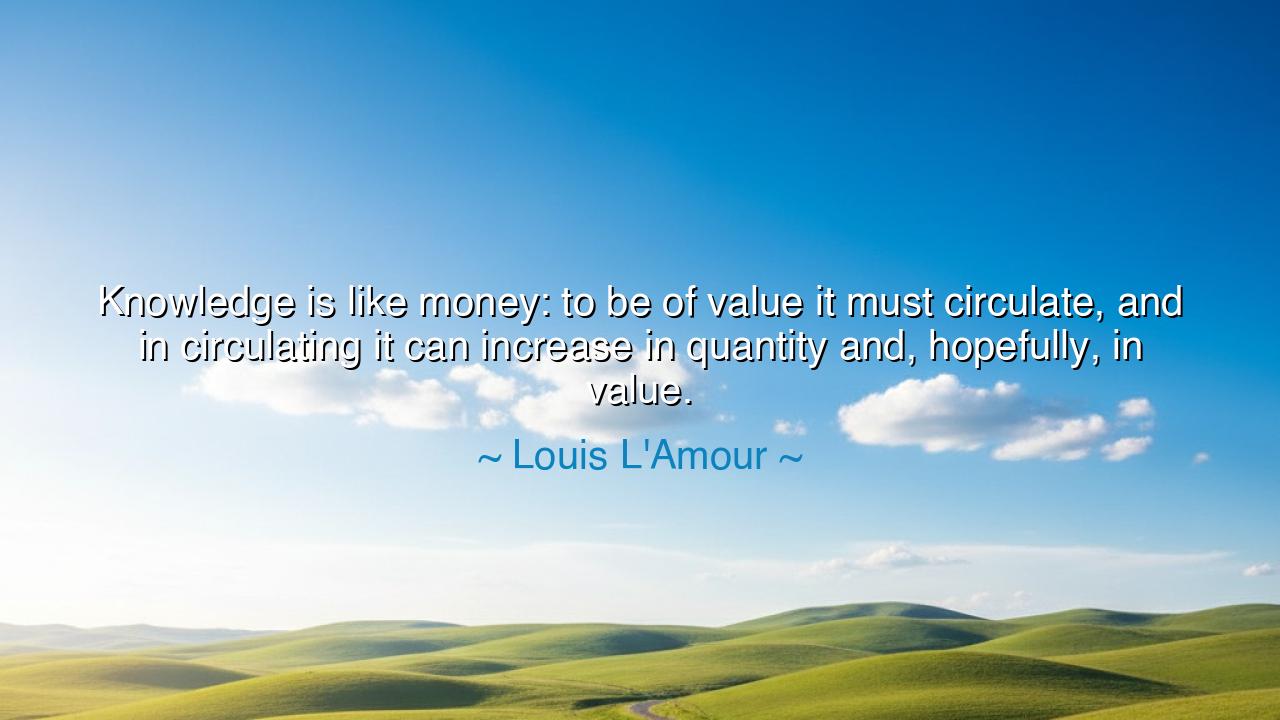
Knowledge is like money: to be of value it must circulate, and in
Knowledge is like money: to be of value it must circulate, and in circulating it can increase in quantity and, hopefully, in value.






Hear the words of Louis L’Amour, teller of stories and keeper of frontier wisdom, who declared: “Knowledge is like money: to be of value it must circulate, and in circulating it can increase in quantity and, hopefully, in value.” In this saying he binds together two forces that shape all of human life: knowledge and wealth. Both, when hoarded, grow stale and lifeless; both, when shared, bring strength, prosperity, and growth. The treasure of the mind, like the treasure of the purse, becomes meaningful only when it flows outward into the world.
The ancients themselves taught this truth. In Athens, the philosophers gathered in the agora, exchanging ideas as merchants exchanged coins. Socrates gave away his thoughts freely, not for gold, but for the sake of sharpening the minds of those who listened. His knowledge grew not because he hoarded it, but because he circulated it among the people, questioning, debating, refining. Just as a coin, passed through many hands, carries commerce across the land, so too did knowledge, passed from mind to mind, enrich the whole city.
Consider the monks of medieval Europe. They copied manuscripts tirelessly, preserving the wisdom of Greece, Rome, and the East. Had they hidden these scrolls away, the light of learning would have died in the Dark Ages. But because they shared it—first in cloisters, then in universities—knowledge multiplied. It crossed nations, inspired discoveries, and brought forth the Renaissance. Like gold placed into trade, wisdom placed into circulation gave birth to new wealth, wealth not of coin but of understanding.
History gives us another mirror in the life of Benjamin Franklin. A man of invention and learning, Franklin did not keep his discoveries for himself. He shared them widely—his lightning rod, his printing, his Poor Richard’s Almanack. His knowledge spread like coin in a thriving market, and in the giving he received more in return, for others built upon his ideas. By circulating wisdom, he increased not only its value but its abundance, proving true L’Amour’s words.
Yet many forget this truth. Some hoard knowledge as misers hoard gold, guarding it jealously, believing it loses value when shared. But like wealth buried in the earth, such knowledge serves no one, not even its possessor. Wisdom locked away is wisdom wasted. It is in the teaching, in the mentoring, in the sharing of books, stories, and counsel, that knowledge comes alive. The teacher grows wiser through teaching, the student grows stronger through learning, and the cycle continues, multiplying both the quantity and the value of truth.
The meaning of L’Amour’s words, then, is both simple and profound: knowledge must flow. Just as stagnant water breeds decay while flowing rivers bring life, so must knowledge be set in motion. It must be spoken, written, taught, debated, and lived. Only in circulation does it transform from personal possession into communal treasure. And as it moves, it grows, for each mind that touches it shapes it, sharpens it, and expands it.
The lesson is this: do not hoard what you know. Share it freely. Teach those who are younger. Speak truth to those who are searching. Write, discuss, and pass on what you have learned, for in doing so, you enrich not only others, but yourself. And seek knowledge from others as you would seek trade in a marketplace, for what you give away will return to you greater, stronger, and more refined. In this way, your knowledge becomes not a treasure hidden, but a river of wisdom flowing through generations.
Therefore, let your practice be thus: when you learn, share; when you teach, listen; when you possess wisdom, give it away, that it may return to you multiplied. For as Louis L’Amour has said with the voice of enduring truth, knowledge is like money: to be of value it must circulate. And in this circulation lies the true wealth of humanity.






AAdministratorAdministrator
Welcome, honored guests. Please leave a comment, we will respond soon